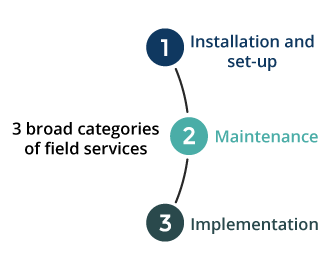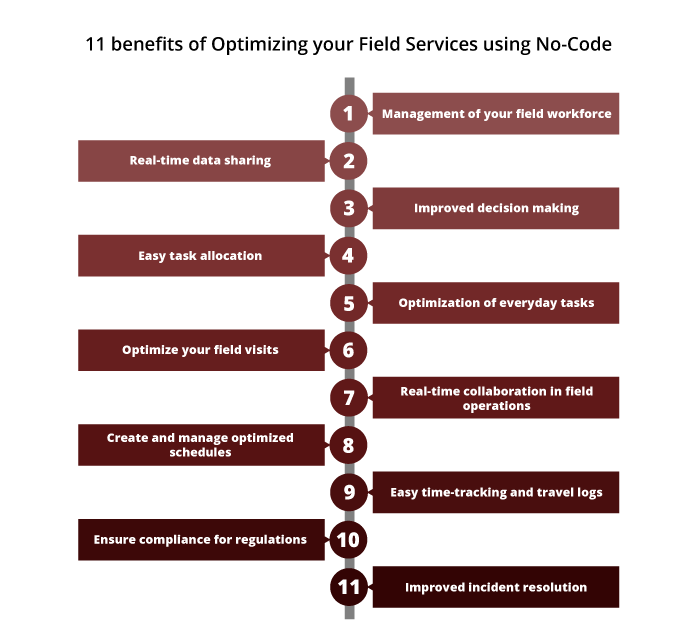
On-field services are integral to making sure that your products and services keep running smoothly. This is especially important for companies in industries like industrials equipment, healthcare, etc, where equipment is essential for the day-to-day operations of a company. Although your current processes and workflows for your field services might be running properly, optimizing your field staff is essential for boosting productivity and enhancing efficiency quickly. This is where a no-code application for field service comes in.
A LCNC platform can help you with field service modernization and enable your field staff workforce to work not just harder but also smarter. Leveraging innovative technologies can help your company reap the benefits of optimizing your Field Services which can further boost your company’s growth. You can easily increase your company’s total revenue by optimizing workflows and task management, and that’s what we’ll be discussing in this article!
What are field services?
Field services consist of any tasks and activities that need to be undertaken at the customer’s location. These services include setting up, maintaining, and repairing equipment in different sectors like healthcare, industrial equipment, and other industries that require hardware and equipment. These activities need to be done by professionals who know their way around all of the equipment and can provide good customer support to those customers. This all needs to be managed using field service management.
Field services can be seen as a great way to increase the overall reputation of the company. Optimizing your field services can lead to better profitability, reduced costs, and enhanced collaboration of the departments involved. There are 3 broad categories of field services:

- Installation and set-up: Companies often need trained professionals to optimally set up equipment at the customer’s property or environment. This could be setting up a roof-top solar installation, or installing an air conditioner. This set-up needs to be done properly to ensure that the hardware and equipment work from the get-go. Field services can help install equipment properly and get the customer started with using the hardware properly.
- Maintenance: Any product needs to be fixed if it breaks or needs to be maintained properly to prevent it from breaking in the first place. An example can be repair of a refrigerator. This maintenance is key for the customer to have a good experience while using your product. This can be done either correctively, in case of a product breaking down or needing recalibration, or proactively, in case of predicting faults or issues in the hardware by analyzing data and fixing the hardware beforehand to prevent larger issues.
The most common form of maintenance is preventative maintenance, which can prevent the larger costly breakdowns through regular inspections and calibrations. An example of this can be a scheduled maintenance of an elevator in your residential or commercial building. Preventative maintenance can be further improved by using digitally connected products that can provide basic analysis and monitor the data received, leading to a faster response and solution from the technicians before they even go on-site. Maintenance is an integral field service as it improves the customer’s perception of the support that you can provide and ensure a problem-free customer lifetime with your company. - Implementation: Field service professionals can ensure that customers make the most out of the service that is provided. These technicians can give special consultations and advice regarding how to solve issues and implement the equipment in the most beneficial way. In this service, field service professionals can become trusted advisors to help solve the doubts of the customers and take the maximum advantage of your equipment and products.
Impact Stories: Quixy helps SV Group of schools cut down maintenance complaints by 70%
Differences Between No-Code & Traditional Development for Field Service Management
| Aspect | Traditional Development Approach | No-Code Approach |
|---|---|---|
| Coding Expertise | Requires in-depth coding skills using programming languages like Java, C#, or Python. | No coding required; users can create applications using a visual interface. |
| Development Speed | Longer development cycles, often taking months or years to complete. | Faster development, typically within days or weeks. |
| Cost | Higher upfront costs for developers, licenses, and infrastructure management. | Lower upfront costs, usually with subscription-based pricing models. |
| Flexibility | Limited flexibility; changes and feature additions are complex and expensive. | Greater flexibility; easy to modify and add new features as needed. |
| Customization | Suitable for highly specialized and complex applications. | Suitable for most business needs with extensive customization options. |
| User Base | Requires a dedicated technical team with coding expertise. | Empowers non-technical users like business analysts to build solutions. |
| Maintenance & Updates | Ongoing maintenance requires technical skills, leading to higher long-term costs. | Maintenance is easier, with automatic updates and low technical requirements. |
| Infrastructure Management | Requires managing underlying infrastructure (servers, databases, etc.). | Hosted and managed by the no-code platform provider. |
| Deployment Time | Longer deployment times due to complex testing and debugging. | Faster deployment with built-in testing and fewer technical hurdles. |
| Scalability | Highly scalable but requires significant resources and planning. | Scalable to a certain extent, depending on platform capabilities. |
Traditional Development: Ideal for complex, highly specialized applications but involves longer development times, higher costs, and less flexibility.
No-Code Development: Best for businesses needing quick, cost-effective solutions with greater flexibility, empowering non-technical users to create and manage applications.
The choice between the two depends on factors such as the complexity of the solution, available resources, and desired speed of deployment.
How can no-code help you optimize your field services?
No-code is an innovative technology that can free you from the complexities of coding. This form of coding can enable you to create platforms for your specific departmental needs without needing a coding expert.
No-code is an innovative technology that can free you from the complexities of coding.
Here are 11 ways in which using no-code for field services can help you:

1. Management of your field workforce
A no-code platform can give you a common platform on which you can assign jobs, tasks, and roles to your field force in one go. Tracking the status of your tasks, geolocation, and providing a clear checklist of tasks has never been so easy. Transparency and accountability are easy to establish using this technology as there is clear visibility into the status of each job.
Also read: 5 ways to achieve Success with No-code Low-Code
2. Real-time data sharing
A common no-code platform enables every member of your field services team to share their status effortlessly. Thus, progress can be easily tracked, and relevant data can also be shared. This data can be made available to everyone concerned, leading to quick data sharing and problem-solving.
3. Improved decision making
There is greater visibility of the progress in tasks using these no-code platforms, leading to clear, informed decision making. This can greatly improve the productivity of your teams. A no-code platform can provide more information due to the transparency of the common visual platform, leading to better decisions on a real-time basis.
4. Easy task allocation
Your field services team needs to be prepared for any issues that may arise at all times. Using a shared platform, it is easier to track the status of employees and identify which individuals are free to take up a new task. Also, if a staff member is unavailable, the task can be quickly reallocated to an idle member, leading to better productivity of the team on the whole.
5. Optimization of everyday tasks
A no-code platform can help you automate your routine activities and speed up your processes on the whole. Tracking the time and attendance of your staff, creating invoices, and making payments can also be optimized to ensure faster processes. Team productivity can become a focal point once these activities are taken care of.
Also read: Supercharge your Productivity with an effective Task Management System
6. Optimize your field visits
You can create checklists with specific key parameters that need to be checked out during field visits. Your field services experts will also be able to capture photos, videos, and other data using this platform leading to a comprehensive database solution. Surveys and regular inspections can also be optimized using specially customized checklists created through a no-code platform.
7. Real-time collaboration in field operations
Through a dedicated no-code platform, your vendors, project teams, clients, and field service professionals can collaborate and solve problems efficiently. Resource management and updates can also be undertaken effectively, leading to better identification of any bottlenecks and issues in real-time.
8. Create and manage optimized schedules
Every piece of equipment needs regular maintenance to keep running smoothly. This can be optimized by creating dedicated schedules for preventative maintenance with regular reminders and notifications. This can lead to minimized emergencies which can reduce operational costs. You can manage all of your assets and customers in one place, leading to efficient asset management and customer relationship management.
9. Easy time-tracking and travel logs
Using a no-code platform, managers can measure time spend and track the time spent in training, R&D, meetings, etc. Team productivity can be measured and analyzed using customer reports generated by the platform. Travel logs can also be simplified using simple options like travel start and end time.
10. Ensure compliance for regulations
Assure that your field services team is compliant with regulations using a compliance tracker tool which can help your quality assurance team identify issues quickly. You can further group workflows based on customizable parameters, leading to regular updates on the status of reported issues.
11. Improved incident resolution
While on-field, a no-code platform can allow employees to report incidents along with any necessary data such as location, pictures, videos, etc. This can speed up the resolution of these reported issues and an EHS checklist could further reduce these issues on the whole.

Improved field services using no-code: A case study of NTrust
NTrust is an insurance company that provides insurance-related products and services to customers in areas like agriculture, aviation, engineering, seaports, etc. As their individual and corporate customers are spread across India, the field staff had to oversee new customer sign-ups, renewals, premium collection, and follow-ups on leads throughout the country.
With tasks being assigned manually and no tracking system in place, delays and team collaboration issues were commonplace. Quixy came up with an efficient solution by automating the allocation and tracking of tasks for the field staff. This led to easy data collection regarding the status of tasks and the employees could easily access their pending tasks. Dedicated dashboards and customized reports also helped identify issues and bottlenecks on a regular basis.
Using Quixy, NTrust was able to improve the utilization of its existing field staff by 40% while simultaneously reducing costs related to manual tracking and allocation of tasks! Read more about the case study here!
Check out Quixy to help optimize your field services!
Field services are essential for your customers to get the full benefits of your products and services. Allocating tasks efficiently, accurate time-tracking, and enhancing productivity can lead to better revenue for your company and a better relationship with your customers.
Quixy is a no-code low-code platform with an intuitive, visual drag-and-drop builder. Our platform can help you increase the efficiency of your field services and help streamline the workflows associated with on-field services. Read more about no-code for field services here.
Don’t miss out on the chance to elevate your processes. Take the first step and get started with Quixy today.
Frequently Asked Questions (FAQs)
Q. What are the benefits of optimizing field services?
Optimizing field services brings numerous advantages. It improves efficiency by automating processes and reducing errors. Enhanced customer satisfaction is achieved through faster response times and improved communication. Cost savings are realized by minimizing travel time, optimizing resource allocation, and increasing productivity. Streamlined operations are facilitated by better coordination and real-time visibility. Additionally, optimizing field services contributes to better decision-making through valuable data insights and analytics. By utilizing technologies like mobile apps, GPS tracking, and route optimization software, businesses can unlock these benefits and achieve greater operational excellence.
Q. Will optimizing field services help save costs?
Absolutely! Optimizing field services leads to significant cost savings. Businesses can reduce operational expenses by minimizing travel time, optimizing resource allocation, and increasing productivity. Moreover, streamlined operations and efficient scheduling help decrease fuel consumption and enhance overall cost-effectiveness. With the right no-code tools and strategies in place, businesses can maximize their ROI by implementing optimized field services that save costs and increase profitability.
Q. How does optimizing field services streamline operations?
Optimizing field services streamlines operations by improving coordination between field teams and the back office. Real-time visibility into field operations allows for better resource allocation and scheduling. Data collection and reporting are simplified, enabling streamlined workflow management. By leveraging technology solutions such as mobile applications, GPS tracking, and cloud-based platforms, businesses can achieve seamless integration and communication across their field service operations, resulting in improved efficiency, reduced downtime, and overall streamlined operations.
Q. Can optimizing field services contribute to better decision-making?
Yes! Optimizing field services provides valuable data insights, analytics, and reporting capabilities, empowering management to make informed decisions. Real-time visibility into field operations allows for better resource allocation and optimized scheduling. Performance metrics and analytics help identify improvement areas and measure strategies’ effectiveness. With comprehensive data at hand, businesses can make data-driven decisions, optimize their field service operations, and align them with their overall business objectives, ultimately leading to better decision-making & improved business outcomes.
Q. What technologies can be used to optimize field services?
Various technologies can be utilized to optimize field services. Mobile applications enable field technicians to access information, capture data, and communicate in real-time. GPS tracking allows for efficient routing and dispatching, minimizing travel time and improving response times. Route optimization software optimizes schedules and reduces fuel consumption. IoT devices enable remote monitoring and predictive maintenance. Cloud-based platforms centralize data, streamline workflows, and provide real-time visibility. Data analytics tools offer insights for better decision-making. By leveraging a combination of these technologies, businesses can optimize their field services, enhance operational efficiency, and deliver exceptional customer experiences.
Q. Is optimizing field services suitable for all types of businesses?
Yes, optimizing field services is beneficial for various industries and businesses that rely on field operations. Whether it’s utilities, telecommunications, healthcare, construction, logistics, or service-oriented companies, optimizing field services can bring value. Any organization that performs field-based tasks, manages a mobile workforce, or delivers services on-site can benefit from streamlined operations, improved efficiency, and enhanced customer satisfaction. By customizing field service optimization strategies and leveraging suitable technologies, businesses of all types and sizes can unlock the benefits of optimized field services and drive greater success in their operations.
Login
Please login to comment
0 Comments
Oldest















